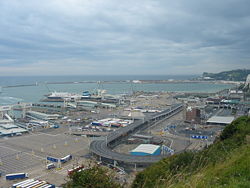Port

Seaport, a painting by Claude Lorrain, 1638
|

Major Ports
|

The Port of Dover, UK is the world's busiest passenger port.
|

Valparaíso, Chile, the main port in that country
|

Port of Miami
|
|
New York/Jersey Seaport seen from the bay.
|
A port is a facility for receiving ships and transferring cargo. They are usually found at the edge of an ocean, sea, river, or lake. Ports often have cargo-handling equipment such as cranes (operated by longshoremen) and forklifts for use in loading/unloading of ships, which may be provided by private interests or public bodies. Often, canneries or other processing facilities will be located near by. Harbour pilots and tugboats are often used to maneuver large ships in tight quarters as they approach and leave the docks. Ports which handle international traffic have customs facilities.
The terms "port" and "seaport" are used for ports that handle ocean-going vessels, and "river port" is used for river traffic, such as barges and other shallow draft vessels. Some ports on a lake, river, or canal have access to a sea or ocean, and are sometimes called "inland ports". A "fishing port" is a type of port or harbor facility particularly suitable for landing and distributing fish. A "dry port" is a term sometimes used to describe a yard used to place containers or conventional bulk cargo, usually connected to a seaport by rail or road. A "warm water port" is a port where the water does not freeze in winter. Because they are available year-round, warm water ports can be of great geopolitical or economic interest, with the ports of Saint Petersburg and Valdez being notable examples. A "port of call" is an intermediate stop, for example to collect supplies or fuel.
Cargo containers allow efficient transport and distribution by eliminating loading of smaller packages at each transportation point, and allowing the shipping unit to be sealed for its entire journey. Standard containers can easily be loaded on a ship, train, truck, or airplane, greatly simplifying intermodal transfers. Cargo often arrives by train and truck to be consolidated at a port and loaded onto a large container ship for international transport. At the destination port, it is distributed by ground transport.
Ports and shipping containers are a vital part of modern Just In Time inventory management strategies.
Ports sometimes fall out of use. Rye, East Sussex, England, UK was an important port in the Middle Ages, but the coastline changed and it is now 2 miles (3.2 km) from the sea, while the ports of Ravenspurn and Dunwich have been lost to coastal erosion. Also in the UK, London on the River Thames, and Manchester, on the Manchester Ship Canal, were once important international ports, but changes in shipping methods, such as the use of containers and larger ships, put them at a disadvantage.
Contents |
See also
Water port topics
- Bandar (Persian word for "port" or "haven")
- Dock (maritime)
- Harbour
- Marina - port for recreational boating
- Port operator
- Ship transport
Other types of ports
Lists
- List of seaports
- World's busiest port
- List of world's busiest transshipment ports
- List of world's busiest port regions
- List of busiest container ports
- Sea rescue organisations
External links
- Port Industry Statistics, American Association of Port Authorities
- World Port Rankings 2006, by metric tons and by TEUs, American Association of Port Authorities (xls format, 26.5kb)
- Information on yachting facilities at 1,613 ports in 191 countries from Noonsite.com
- Social & Economic Benefits of PORTS from "NOAA Socioeconomics" website initiative
